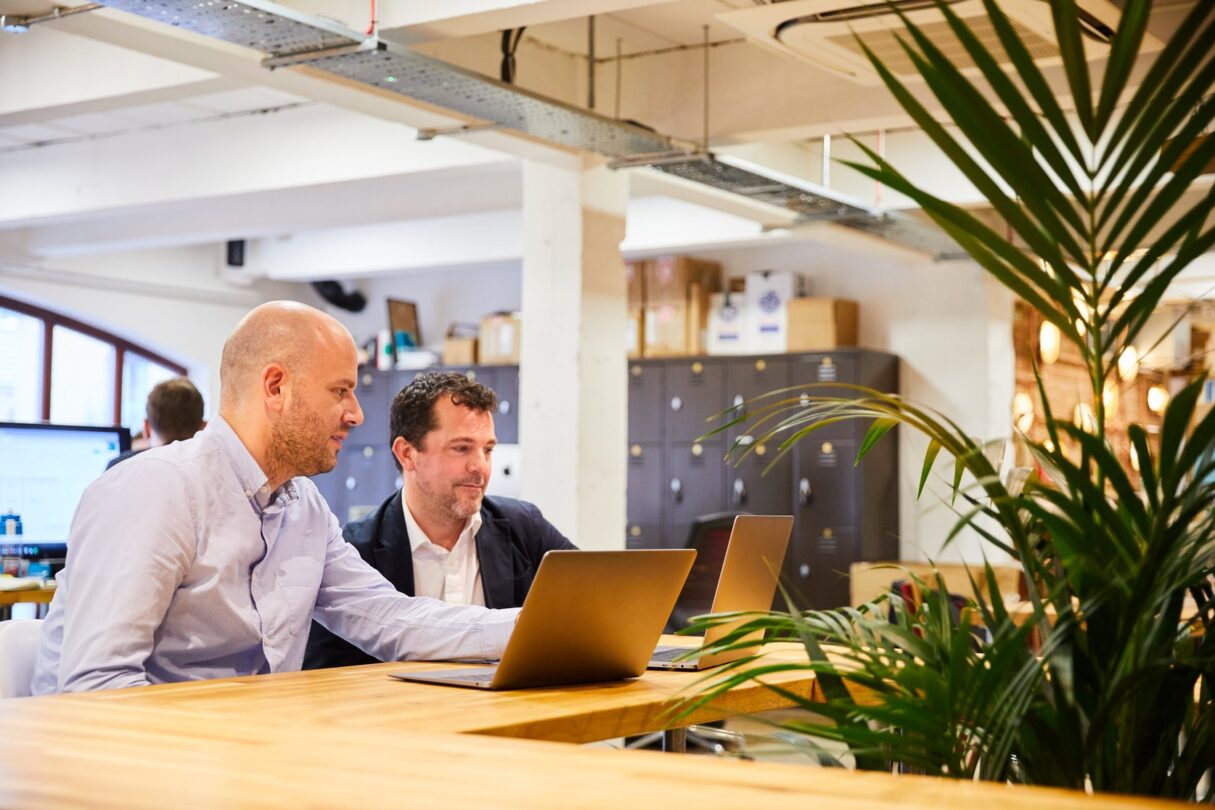Strategy, Legal & Operations
Going green: What it means and how small businesses benefit
Discover what going green means for your business, including how to do it and how it can help your bottom line (as well as the planet).

For Solveiga Pakštaitė, it was a humble brown banana that led her to going green. She’s the founder of Mimica, an industry-disrupting piece of tech that tells you exactly when food spoils.
“[Its] skin was changing and was turning brown and spotty and a bit bumpy,” she said on the Sound Advice podcast. “It was clear that the banana was not as young and fresh as it used to be, and needed to be eaten soon.”
What if, she wondered, something could exist that would mimic this same state of decay, cutting down on waste and improving food safety at the same time?
Studying industrial design, Pakštaitė decided to make her final year project a temperature-sensitive tag that tells you exactly when food spoils.
Clearly, this is a sustainable business on a particularly grand scale (after all, not everyone can invent a new technology that specifically combats an ecological problem).
But what if making small changes to things like the way your product is delivered to customers, or what it’s delivered in, could help boost sales at the same time as protecting the environment?
Since the pandemic, as restrictions have inhibited movement across the globe, consumers have had more time at home than ever before, with a resulting uptick in at-home luxuries such as coffee, hair colour and vitamins, as well as an obvious spike in online shopping (the UK saw its highest online sales growth in 13 years).
Adding to this was another, perhaps more surprising, factor.
When given more time to think about their purchases, consumers were found to increasingly prioritise factors such as brand reputation, ethics and sustainability, with price not the primary consideration.
More than a third of British consumers say they are buying products from companies with strong environmental credentials, 84% of UK and US consumers say a poor environmental track record would cause them to stop buying from a brand, and nearly half of UK and US consumers are willing to pay a premium for brands that are socially conscious.
So, what does this mean for your business?
Here’s what we cover in this article:
What going green means for business
The green business opportunity
4 businesses benefiting from going green
FAQs: The benefits of going green
What going green means for business
Sustainable measures are not just for big business.
When the UN announced its ‘Race to Zero’ campaign – a global alliance committed to achieving net zero carbon emissions by 2050 – a brace of UK FTSE 100 companies signed up for the challenge, with nearly one in three of the UK’s largest businesses committing to cutting emissions in their supply chains.
This took the form of big, weighty promises: companies such as Rolls-Royce started recycling their jet engines; housing company Barratt constructed a hydroelectric turbine to feed renewable energy into the national grid.
But measures don’t always have to be so grand or expensive.
Small and medium-sized companies are being urged to also join the Race to Zero, as collectively they have a meaningful influence on the ecological health of a nation.
Going green for small businesses means considering your company’s overall ecological friendliness.
If you are selling products, that means thinking about how green your product could be throughout its life cycle: from its creation to packaging, delivery and the eventual end of its life.
Is it made in a factory where workers are paid fairly and a sustainable framework such as the Global Reporting Initiative is followed?
(The GRI is an independent organisation that helps businesses to take responsibility for their impacts, by providing a common language to communicate them in the form of the world’s most widely used standards for sustainability reporting.)
Does your product or packaging contain any materials that are ethically unsound, such as micro-plastics?
These plastic fragments heavily contribute to pollution levels by entering natural ecosystems so easily, by virtue of their size which is less than 5mm.
And do you have a recycling scheme in place once the customer has finished with it?
Being environmentally friendly means different things for different businesses.
Like Mimica, your company may put sustainability at the heart of its mission. But even if your primary objective is not sustainability, injecting your business with those values will prove useful: to your bottom line, your customer and the planet.
The green business opportunity
“On average, we’ve got 11 old consumer tech devices lying in drawers, under the stairs, and in a box somewhere,” said Steve Oliver, co-founder of musicMagpie, on the Sound Advice podcast.
“There’s £16bn worth of product lying around.”
Oliver put these old phones to good use in what is now musicMagpie, the UK e-tailer that buys old devices, restores them and sells them on in a neat example of a circular economy.
His business shows the sheer potential of employing ecologically sound principles. And there is a raft of evidence over the past decade that shows when it comes to going green, consumers are keener than ever to put their money where their mouth is.
Sustainable items in the fast-moving consumer goods (FMCG) sector (those with a short shelf life, such as beer or milk), are performing particularly well.
Globally, the most environmentally conscious consumers are worth £276bn to the FMCG sector and are becoming more valuable to the tune of £56bn in the past year, according to a 2020 survey by Kantar.
Shoppers worldwide are looking to make sustainable purchases, particularly mid-pandemic. Research from Retail Times found that more than a third (38%) of consumers in the UK and Republic of Ireland always check an item’s credentials.
The sourcing of products has also become more of a concern, with customers looking to buy where they live.
More than a third say that when making a purchase, a product must be naturally sourced, locally sourced or sustainable, with 56% also preferring to buy products that can be delivered from within their own country.
More than a third of shoppers have knowingly paid more for green products since the pandemic struck, and 51% think the eco credentials of a product are now just as important as the price they pay for it, according to Circular Online.
An Accenture report also found that customer motivations had shifted during the pandemic, emphasising that purchasing behaviour once considered ‘peripheral# has now entered the mainstream.
It appears shoppers are more conscious about a product’s origins, and price is not the main motivation when it comes to adding to their cart.
Yet, there is still a large issue preventing customers from making sustainable purchases: trust.
Many feel brands are not living up to their eco credentials, which has been backed up by data. In a sweep of around 500 global websites, the International Consumer Protection and Enforcement Network (ICPEN) found that 40% of green claims made online were misleading and therefore potentially break consumer law.
The sweep found vague language such as ‘natural’ or ‘eco-friendly’ without information to back these claims, as well as hiding information such as levels of pollution levels to appear more eco-friendly, as well as own-brand eco labels that were not affiliated with any organisation.
The findings prove shoppers are keen to make sustainable purchases, but are wary about greenwashing. If businesses can prove their green credentials in a transparent, accurate way, the market remains as open as ever.
How businesses can go green
Now you know the ethical and financial considerations of making your business eco-friendly, where do you get started? And where does small business software fit in with sustainability?
First, consult our guide on eight ways to make your business more sustainable. It has tips on practical things you can get started with right now, from using cloud payroll software so you reduce the need for paper, to working with local suppliers.
Increasingly, companies are looking to sustainability consultants for an in-depth view of their green practices. They can be particularly useful for generating hard data for stakeholders, regulators, or simply to benchmark against.
If you’re not at that point yet, first consider what you can do in your workplace to make it greener, from using natural light or replacing your gas boiler to installing flow restrictor taps and composting office leftovers.
Creating a staff ‘green team’ can often help with identifying and activating these changes, as well as boosting morale.
Next, take a look at the other players in your network.
Has your manufacturer set reduction goals? Is your delivery service using energy-efficient vehicles? Is your packaging biodegradable?
It’s worth looking across the whole chain to get a holistic view of how green your process is, and what changes you need to make.
7 benefits of going green
Still unsure about taking the plunge and going green?
Here are some regularly cited advantages of making your business eco-friendly, as well as some you might have not considered before.
1. Enhanced brand image
Ramping up your green credentials could give you the competitive edge when it comes to standing out in a crowded marketplace.
Three-quarters of consumers said they are attracted to brands that source services and materials in highly ethical ways, according to a report from Accenture. Meanwhile, 72% of people surveyed by Eon said they pay attention to whether a business acts in a climate-friendly way.
And research from GWI found that study revealed seven in 10 internet users believed big corporations (of any kind) should be doing more to address environmental issues.
2. Green as a status symbol
More than ever, consumers are swapping out traditional status symbols for their cooler, greener counterparts.
Think Teslas instead of petrol or diesel-powered supercars, and solar-powered homes instead of mega-mansions.
This trend has transcended industry, with the way we travel, eat and live all being disrupted in recent years. If your brand can combine sustainability with covetability, it could enter this luxury arena.
3. Increased productivity and reduced costs
Efficiency saves money, so thinking carefully about how to make your business waste as little as possible will have a knock-on effect to costs.
In trials, a new ‘green calculator’ from O2 could find an average potential annual saving of £2.6m for a company of 1,000 employees.
But it’s not just large companies that could see lower costs by going green. Relatively minor improvements to lighting, heating, water and waste management could see ‘significant savings‘ for SMEs, according to Barclays.
4. Better financial and investment opportunities
Green-focused startups can often take advantage of a far wider range of grants, loans and funding than a traditional business might.
You can see if you’re eligible for funding from ventures such as the Clean Growth Fund, the Carbon Trust Green Business Fund or the Bio-energy Capital Grants Scheme.
And there are also many county-specific grants available to boost local green businesses.
Don’t forget the smaller changes you can enact and be rewarded for. Anything from installing charging points for electric vehicles at your workplace, to joining the Cycle to Work scheme.
5. Increased preparedness for future legislation
Going green may involve an outlay now, but it could save you a significant amount further down the line, should the government or your industry enforce specific green provisions or regulations.
For example, the UK’s Ten Point Plan has put recommendations in place that will affect workplaces, so making sure your offices are energy-efficient now is a good way to avoid having to play catch up.
6. Impact on employee morale
Ensuring your workplace has sustainability in both its mission impact statement and day-to-day duties has been proven to improve recruitment, retention and morale of employees.
Staff have shown to have an increased sense of loyalty, pride and satisfaction in working for a company that has strong ethical and environmental leanings.
A 2011 study found that employees are more likely to be satisfied with their jobs if they are working for a company that is perceived to be green. And this statement has only been compounded in recent years, with three quarters of office workers saying their employers could ‘do more’ to address climate change and be more environmentally friendly.
7. Healthier work environment for employees
Employee benefits of their workplace going green are not just limited to cheaper bicycles. Improving things such as ventilation, adding greenery, and swapping out regular light bulbs for LED ones have proven to have improved staff’s physical health both inside and outside of the workplace, from inducing better sleep to reducing respiratory viruses.
As well as these changes, the likes of flexible working and break-out spaces have been proven to boost staff’s mental wellbeing.
4 businesses benefiting from going green
When thinking about making your business green, it’s always good to have some inspiration on tap.
Here are just a few high-profile businesses and founders that have made going green look seriously covetable.
1. Stella McCartney
“No one wants to be told they can’t buy a leather handbag. They’ll buy five if I tell them not to. [What I make] has to be sexy, desirable,” said Stella McCartney to the Financial Times.
The fashion designer’s commitment to making eco values fashion forward has paid off. Her brand, which prefers recycled cashmere and vegetarian leather to fur, is thought to make around £250m in annual revenue, with luxury conglomerate LVMH acquiring a minority stake in the company in 2019.
2. Polo Ralph Lauren
The all-American fashion house has gone green on the tennis court, designing uniforms for the US Open that gave a clever nod to their origins.
The team at Polo Ralph Lauren went so far as to collect plastic bottles and tennis ball cans from last year’s event, upcycling them to make clothing for the tournament staff.
3. Ørsted
This Danish renewable energy provider was formerly known as coal-intensive. Following an intense pivot, it has now been crowned the most sustainable energy company in the world for the past three years.
It offers wind power, solar energy and storage and renewable hydrogen to Denmark, as well as other countries.
4. Allbirds and Adidas
An eco footwear company floating Wall Street’s first-ever sustainable IPO and the largest sportswear brand in Europe might seem an unlikely match.
But the trainer brands collaborated to create the Futurecraft.Footprint, a high-performance running shoe with the lowest carbon footprint in the world.
It’s currently a proof of concept but the two brands are working on development and a launch date will be announced in due course.
The green business ecosystem
Imagine there’s a local coffee shop in town.
Offering 100% recyclable cups to its customers, it has invested in an energy-saving espresso machine and offers customers products from other green companies at the till, such as glass straws or reusable cups.
The cafe also donates its used grounds to a company that transforms them into ‘coffee logs’ – a log that you can put on your fire that helps reduce greenhouse gas emissions.
The above is an ideal example of a green business ecosystem, where everybody from supplier to customer and distributor all work together to create green products or services.
Two examples have been featured on the Sound Advice podcast.
Mathew Porter is CEO of Vaso, a glass straw company, and Arthur Kay is the founder of BioBean, which recycles coffee grounds into a variety of materials, from fuel to flavouring agents.
As well as taking steps to make your own business go green, you should also be thinking about ways to work it into an existing circular economy.
You can’t be responsible for every part of a green process, so committed partners are paramount.
It’s worth remembering that even companies who are dedicated to reusing, such as musicMagpie, are not involved in every link of the chain.
As its CEO says: “Somebody told me years ago that structurally broken black DVD cases go into road surfaces. The aluminium in the disc itself goes into car headlights. The plastic from the cases goes into plastic cups at water coolers.
“Our waste partners reuse everything.”
FAQs: The benefits of going green
By going green you can positively influence your people, your profit, and the planet. Here’s a quickfire summary of the key benefits for your small business, and how to get started.
Is going green good for business?
Going green has several benefits for companies. It can cut costs, improve efficiency, and create healthier workplaces.
Less tangible benefits include improving brand reputation and customer loyalty, as well as staff morale.
Why is going green important for businesses?
Going green will not just help your business to drive revenue and solidify its reputation and reputationally, it will also help the planet.
Collectively, SMEs contribute enormously to the global economy, and due to their flexibility and reactive nature, they are well-suited to pioneer eco initiatives and become part of a green solution.
Do companies save money by going green?
Going green can help to save money for you and your business in the long run. Cutting down on energy, whether it’s by going paperless, using LED lightbulbs or sourcing second-hand office furniture, means fewer operating costs.
How do I get started with going green?
You don’t have to wait until you have a full-blown sustainability strategy to make small changes that have a big impact.
From recycling your coffee grounds to sourcing recyclable product packaging, there are plenty of things you can do today. Start by reading this article: 5 ways to be a more sustainable business.
Editor’s note: This article was first published in September 2021 and has been updated for relevance.
Sustainability Hub
Explore how your small business can create a robust sustainability strategy, save money, and attract more customers by visiting the Sustainability Hub.







Ask the author a question or share your advice